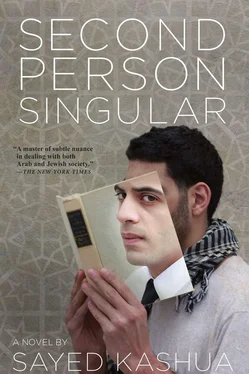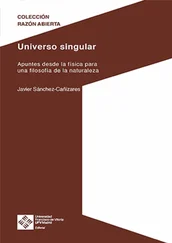“What are you smiling about?” I heard Nabil’s voice nearby. He stood before me, head cocked to the side.
“What? Oh, me, nothing,” I said, and um-Bassem came out of the mosque just in time to save me. “Allah Akbar, Allah Akbar,” I mumbled, following the coffin with my head bowed, and I knew then that as soon as the ceremony was over I’d grab my bag and leave.
GUEST ROOM
Over the past four years Yonatan’s condition had gotten worse. On the day that Ruchaleh paid my tuition for my freshman year at Bezalel, he was taken to the hospital.
“You’ll pay me back in installments,” she said when I refused to take the money, and she suggested subtracting five hundred shekels a month from my paycheck, even though we both knew that didn’t even cover half of the monthly tuition fees.
That night I hadn’t been able to feed Yonatan, or maybe it was as Ruchaleh said later at the hospital, that he refused to eat. He spit up the water substitute and his gelatinous meal, and when I came in to relieve Osnat, she said he had done the same with his breakfast and lunch. If this persists, she said, we’ll have to take him to the hospital, even though he doesn’t have a fever.
That night something changed in Yonatan. He reacted differently to our attempts to dress him, change him, moisturize him. Strange though it may sound to say about an irresponsive body, I felt that his skin had thickened and his bones and muscles had hardened.
When he didn’t ingest a thing during dinner, I told Ruchaleh that I didn’t think we should wait any more.
“He’s trying to kill himself,” Ruchaleh said later that night, in the waiting room outside the ER. That was the first time I saw her cry.
The doctors did blood tests, urine tests, a lung X-ray, and a CT scan and found nothing out of the ordinary.
“So he’s in good shape, then?” Ruchaleh quipped, but the Arab resident who’d given her the results didn’t laugh. “Arabs aren’t too strong on the sense of humor front, are they?” she asked me afterward.
In the small hours of the night Ruchaleh and I returned home. Yonatan remained in the hospital for a few more days, for observation.
On the way back Ruchaleh tried to sing along with the radio but she ended up just shaking her head back and forth.
“Are you sleeping at home?” she asked out of the blue, “or are you going to sleep over at that girl’s house?”
Her question shocked me because I had not told her or anyone else about the girl. “What girl? I don’t have a girl,” I said, and Ruchaleh smiled and again tried to sing along with the radio but she got hooked onto a different song, one that wasn’t playing, and all the way home she kept mumbling the lyrics, “Hug me hard, kiss me till it hurts, and the sun won’t set.”
When we got home, Ruchaleh said she needed a drink and she poured herself a glass of whiskey, neat, and drained it in a single gulp. Then she asked me if I wanted anything to drink.
“Yes,” I said, “but something else, if you have.” Up until that night the only alcohol I’d ever had was a beer now and again with Majdi, whenever he brought a bottle or two home, and red wine, occasionally, when he was given a bottle from the hotel as a Rosh Hashanah gift.
“I don’t have beer,” Ruchaleh said, taking a bottle of white wine out of the fridge. “White wine is usually chilled,” she said, and she showed me how to pull out the cork. Then she drank two glasses while I struggled with one.
“Do you even know how it happened?” she asked me, pouring herself another whiskey. I was silent and I think she interpreted that as a no . We’d never spoken about it. The accident, was how Osnat and I referred to it and that was all that Osnat knew. Yonatan had been in an accident.
“One fine day I came home and found him hanging from the ceiling,” she said, nodding her head and throwing back her whiskey. “I hugged his feet,” she said, demonstrating with her arms. “Then I got up on the bed. I grabbed his legs with one arm and tried to lift him with the other, putting all his weight on me as I tried to free his neck from the noose. Did you know that? Did you know that’s what Yonatan did to me?”
She took out a cigarette for herself and offered me one, too. I poured another glass of wine and watched the cigarette shake between her fingers.
“What do you say?” she said, trying to take the edge off the melancholy. “Would you do that to your mother?”
“No,” I said, smiling a bit for her benefit. “But I’d do it to myself.”
That was the first night I didn’t sleep up in the attic. Ruchaleh told me that she hated that room so much she could barely bring herself to walk into it, that she had an involuntary response upon entry, her eyes darting toward the ceiling, where there had been a light fixture, and where she found her son’s body, swaying in the air. He had been hospitalized in Israel for six months and was then flown to the United States, Belgium, and Switzerland. They — that is, Ruchaleh and Yakov, Yonatan’s father a professor of comparative literature at Berkeley — were never married, but they had lived together while Ruchaleh studied and, later, worked in Berkeley. When Yonatan was three, they split up and she came back to Israel. Yakov was all right, she said. Boring and a bastard, a long story, but nothing terrible. The truth is he really was all right, maybe, she couldn’t remember. Back when Yonatan was healthy, he would come visit them in Jerusalem twice a year, on Christmas and Passover, and would stay with them.
“This was his room,” Ruchaleh said, opening the door to the room that Osnat and I called the guest room, even though we’d never seen a guest. “You can sleep here tonight,” she said, and then pointed at the closet. “There are sheets on the top shelf and, by the way, I’d be happy if you made this your room. When you’re not with Yonatan, that is, on your days off from school or whatever. Instead of wandering around the streets like some homeless Arab you could just stay here. And do me a favor,” she said before leaving the room, “don’t get any big ideas in your head, okay? If you want to hang yourself, do it in your mother’s house in Jaljulia.”
THE FEEDING TUBE
Yonatan came home from the hospital with a feeding tube, a kind of straw that was anchored to the wall of his stomach on one end and dangled out of his right nostril on the other. Osnat gave me a brief tutorial and from that day on we started injecting his food into the tube. I learned how to extract the tube, how to clean it, and how to make sure it was not clogged. I’d shoot a syringe full of air into the tube and put a stethoscope to his stomach, listening for air bubbles.
Yonatan was in and out of the hospital over the next four years. He had infections of the intestines and the lungs, aspirational pneumonia, urinary tract infections, lung failures. Everything became more difficult. For some reason he also started to bleed whenever I shaved him, even with an electric shaver. I had the feeling that he didn’t want me touching him. It was around then that Osnat told me she was considering leaving and looking for a different job, one where she could be of more use. “Someplace a little less frustrating,” she said, and I asked her to please stay on a little longer, promised her that I would take care of all the more difficult tasks — the showers, the haircuts, the dressing and undressing and diaper changing — and that I’d do it all before she came in or after she went home.
“That doesn’t sound fair,” she said, but I insisted, explaining that Yonatan had become a friend, an ally, and that I would do anything to make sure that he did not have to part with a loving caretaker like herself, that I would do anything to ease him through his last days.
Читать дальше












